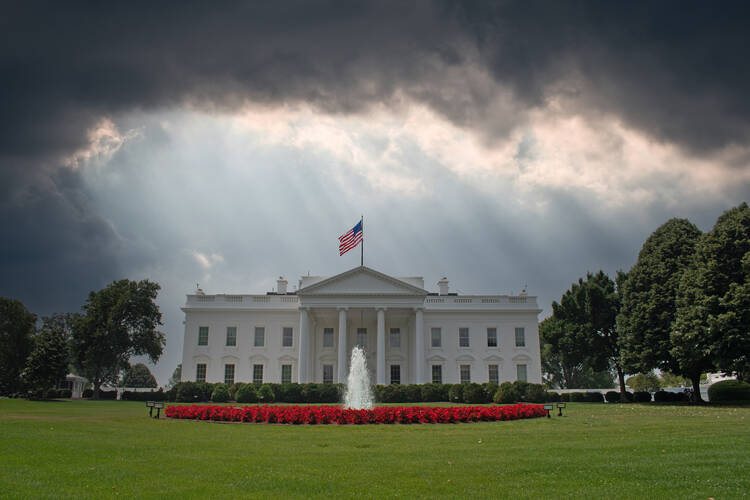This article is part of America’s series applying Ignatian principles to election season.
On Christmas morning 2020 my family came the closest it has ever come to falling apart. Somehow the bonds of love and toleration that overcame the stigma of interracial marriage, the challenge of differing religions, sexualities and ways of life had reached their elastic limit, and the breaking point was imminent.
Given all that my family had survived, what force or power could divide us? To my great surprise, it was not some scintillating secret, blatant betrayal or vitriolic violence. No crime was committed, no confidence breached. No. The entity that took my family to the precipice of partition was...an elf doll.
Well, it wasn’t just the elf doll. I must here give a disclaimer: Christmas 2020 is more alliteratively known as Covid Christmas, and I, like millions of Americans, was isolated and celebrated the holiday alone hundreds of miles from my family. So everything I know about the story is secondhand and was revealed slowly by a steady stream of text messages from all the parties involved.
Apparently, during the family gift exchange, my cousin gave my mother the aforementioned gift—a doll of Santa’s unpaid helper—who was wearing a shirt favoring a political candidate my mother detested (but whom my cousin and his mother, her sister, supported).
Mom felt embarrassed and uncomfortable when she opened it (although my cousin only meant it as a joke). This soon turned to sadness when another relative chided her, urging her to lighten up: “It’s just a joke.” My mom’s eyes welled with tears. Yet another relative rolled her eyes, causing still another relative to enter the ring to defend both sides. Everyone else did their best wallpaper impression and tried to disappear.
The whole thing was a disaster: My family left in icy awkwardness, and the parties involved refused to speak to one another for months (more than a year in one case). The reader will probably be amused that something so trivial could result in a crisis of such epic proportions, but I am sure that my family is not alone.
My family’s Christmas crisis is only a snapshot of the deep-seated misunderstanding that seems to have exploded in our current political climate and shows no sign of diminishment. Each year, the scathing rhetoric that dominates our national discourse grows more extreme and divisive. As politicians abandon civility, polarization turns disagreements into impenetrable barriers, and faux pas into war crimes. Our passion for our own view and confidence in our favorite candidates can destroy lifetime friendships, separate spouses and fracture families.
Passion for politics is a good force; and fighting for our understanding of justice according to our (well-formed) consciences is not only laudable but mandatory for Catholics. However, as Christians, every action we take must be tempered by the greatest virtue: love. If we forget this most important value in our discourse with others, then every small interaction among friends or associates is a potential Elfgate.
In his Spiritual Exercises, St. Ignatius Loyola gives excellent advice on how to lead with love, despite differences of opinion and perception, in something he called the presupposition. The presupposition is found in the list of instructions that Ignatius gives to retreat directors at the start of the exercises. Ignatius writes: “Every good Christian ought to be more ready to give a favorable interpretation to another’s statement than to condemn it. But if he cannot do so, let him ask how the other understands it. And if the latter understands it badly, let the former correct him with love. If that does not suffice, let the Christian try all suitable ways to bring the other to a correct interpretation so that he may be saved” (as translated and quoted in Catechism of the Catholic Church, 1997, para. 2578).
Note that the presupposition does not ask us to agree with our interlocutors, nor does it require us to compromise our own values and thoughts. The presupposition only demands that we recall that the person with whom we are speaking is loved by God into existence, just as we are, and is sincere in stating her position, just as we are. It reminds us that disagreement need not carry any threat or meaning beyond a difference in opinion in a particular situation. When we presume the best, we can actually listen to one another; the adrenaline fight-or-flight reaction to potential danger gives way to rational consideration, and in that calmer space an elf doll ceases to be an agent of insult and mockery and becomes an unfortunate joke, a junk gift. It might still cause pain, but the presupposition allows us to assume that pain was not the giver’s intent.
Eventually, long after Elfgate, my family was reunited by the force that bound us in the first place: love. My mother’s failing health and my father’s death allowed reality to overcome pettiness and misunderstanding. Hearts were broken, and then broken open. Love could flow again. Only in retrospect can we see what a loss that time was: months where everyone involved was alive and active, time we could have spent together. Time is precious, and each moment is irrevocable: Why waste it in misery?
The friend or loved one on the other side of the political divide is the same good person they have always been. As election day draws nearer we could all benefit by beginning each interaction with the presupposition. This election year, when differences in opinion arise, why not resolve to take a breath to remember: We need not lose one another over politics.
Read more:
Tim Muldoon on praying the Examen during election season.
James Martin, S.J., on finding hope during a time of polarization.
Quang D. Tran, S.J., on how parents can avoid passing election stress on to their children.
Joe Laramie, S.J., on cura personalis and making a mess before election night.








